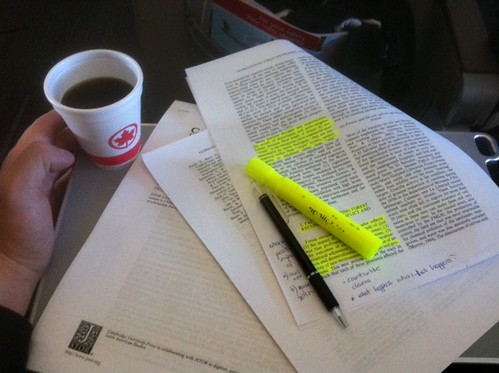Reading is an integral part of academic life. We expect our students that they read journal articles, book chapters, books and other materials as background to our lectures. But with the haste of academic life, it looks like the only times when we actually engage in reading scholarship is when we need to engage in a broad literature review and prepare our next paper, book chapter, or manuscript. Reading also has an impact on our writing.
The other day, I was joking with Tanya Golash-Boza (one of my favorite writers on all things academic life, and a tenured professor at University of California Merced) over Twitter that I was no longer able to speak Academiquese because of the fact that I used social media (Facebook, Twitter, Pinterest, and of course this blog). I blame my inability to write obscure, jargon-laden prose on the fact that I prefer if my scholarship reaches a broader audience and actually has a positive effect on policy making and on societal welfare.
But the truth is that we do need to write in a more “academic” way. Contrary to what one of the professors and my own PhD advisors said (to write as I would speak), more often than not, academic output doesn’t follow this pattern. Since the audience for most of our academic writing is other scholars, it is important to write for the audience we have. Thus, whenever I write a paper for a political science journal (specifically public policy), I make sure to read a few articles from the journal I’m targeting, as well as similar ones.
So, given that I write at least 2 hours every day, and with all my other duties (grant writing, dealing with peer reviews, administrative workload, outreach, etc.), when on Earth do I actually have time to read? Well, the reality is, I also book time to read. I schedule my life pretty much to the 30 minute block. I assign at least 30 minutes to 2 hours a day to read. This time is in addition to the time I book to write. This schedule is going to be hard to maintain in the fall when I start teaching again, but my hope is to at least keep this program of work in the fall.
But what happens if you can’t carve 30 minutes to 2 hours a day to read? This happens to me quite often, particularly when I travel for academic conferences or fieldwork. In these cases, I read on the plane, on the bus, first thing in the morning, and before I head to bed. I love reading, and even if all I read is academic literature, I still have a blast.
One of the most important elements of reading as a tool to improve my academic writing is to take notes. While not a complete fan of the Cornell Notes, I do take detailed notes on the journal articles, books and book chapters I read. This is particularly important because of attribution. Because I need to make sure that I attribute quotes to specific journal articles, making detailed notes is key to my research workflow and process.
I find that if I don’t read as a preliminary activity to my writing, I often use more colloquial prose. Thus one of the activities I engage in is reading a journal article, or a book chapter right before starting to write. This is particularly important as it kick-starts my thinking around the issues I want to tackle in the manuscript. As this article indicates, reading does have very positive effects on your mind.
An interesting website by Dr. Matt Might who provides a series of useful tips for academics is here, including a couple on writing. I don’t necessarily agree with all of his tips, but they’re good. Except of course, the “don’t work at home” one, because I do actually work at home, and I have the best possible home office.




I also schedule time to read. It is so so important. Stephen King once said that if you don’t have time to read, you don’t have time to write. I always take ample time to read before I start writing. It helps focus my mind on the task at hand and the terminology that I need to be using for that particular writing project. Thanks for an interesting post.